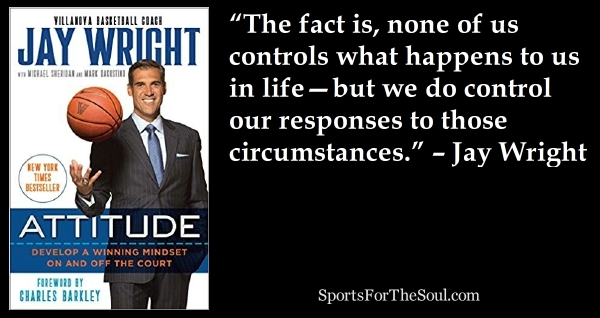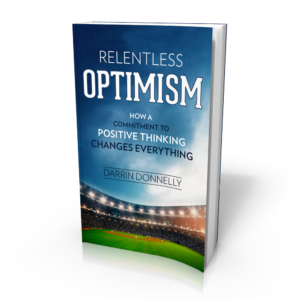 If you look closely at Villanova basketball coach Jay Wright’s right wrist, you’ll notice he’s often wearing a blue bracelet that says: “ATTITUDE.”
If you look closely at Villanova basketball coach Jay Wright’s right wrist, you’ll notice he’s often wearing a blue bracelet that says: “ATTITUDE.”
When the Jay Wright-coached Villanova Wildcats break a huddle, they always shout the word: “ATTITUDE.”
When Jay Wright wrote a book after his Wildcats won the 2016 National Championship, he titled it: “ATTITUDE.”
There’s no doubt about it, Jay Wright has built his basketball dynasty on one thing: ATTITUDE.
In the passage below, Jay Wright explains why a positive attitude is the foundation for everything he does and how he came to realize that success for any organization starts with attitude…
Our attitude sustains us and is the foundation for all that we do—off and on the court.
The fact is, none of us controls what happens to us in life—but we do control our responses to those circumstances. Here at Villanova, we believe it’s important to remain positive no matter how tough it gets, or how many points you give up, or how much of a challenge you face in the final 4.7 seconds of a game.
That is exactly why “Attitude” is the most important of our Villanova values, and the very last word we say to one another before taking the court.
I don’t specifically recall when that “Attitude” chant began for us. Like a lot of things we do, it’s probably a combination of borrowed philosophies I have picked up over the years. I do know it dates to my early days at Hofstra.
Hofstra wasn’t a good basketball team then. Game plans and strategic tactics were not going to turn our roster into a super-talented group. We were losing games. The one thing we could do to improve ourselves was to bring a great attitude, every day, to confront the challenges we faced.
“Don’t walk around like a loser,” I told the players. “Walk around with a great attitude. That’s what we can control.”
We were struggling so much in that first season at Hofstra, I would find myself playing Louis Armstrong’s version of “What a Wonderful World” in the car just to buoy my spirits. One night, I played that song for the team in the locker room.
Some undoubtedly wondered if the coach was losing it. But I was trying to change their attitude because we couldn’t seem to change anything else.
In the end, it worked. The only thing we accomplished during that 1994-1995 season was maintaining a positive attitude. Our record was poor (10-18), but we felt good about our effort.
Seeing that a good attitude had an impact on us that year, it dawned on me that this was an idea worth hanging on to. Somehow that morphed into the chant, “1, 2, 3, Attitude!”
It’s served our teams well ever since.
— Jay Wright, from his book ATTITUDE
Jay Wright has built the Villanova Wildcats into the hottest basketball program in the country—winning two National Championships in the past three seasons.
What’s fascinating to me about the story above is that Jay Wright decided to focus on building and maintaining a positive attitude before he had the tools to compete for conference and national titles. He built his team with attitude before he could build it with top-level talent.
Even when his early teams were struggling, he recognized that attitude would determine his program’s future.
The attitude came first. The victories followed.
It’s easy to maintain a positive attitude when everything is going well. But those who can keep moving forward with a positive attitude when times are tough are the ones who will separate themselves from everyone else.
Again and again, I find it interesting that the most successful coaches openly admit that they can’t control everything that happens to them—and that includes the final score. The results, they understand, are often out of their hands.
This viewpoint flies in the face of so much self-help literature, which promises that you can take total control of everything that happens in your life.
But that’s simply not true. None of us controls every event that happens to us.
But, as Jay Wright (and pretty much every other successful coach I’ve studied) teaches, while we don’t control every event that we encounter, we do control how we respond to those events. We may not control everything, but we do control the most important things: our effort and our attitude.
And when we respond to the adversity outside of our control with maximum effort and a positive attitude, good things eventually come our way.







